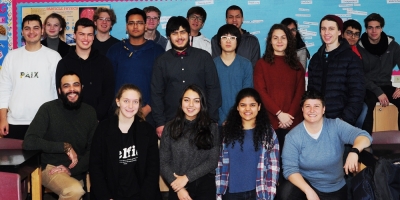Grade 9 student and physics enthusiast, Roman M. was invited into the Grade 12 IB Physics classes to help teach quantum mechanics and particle physics. Grade 12 students had been studying the topic for over a week in preparation for Roman’s lessons and activities which focused on spin of particles, particle interactions, colour charge, and Feynman diagrams.
Roman’s passion for Physics is so inspirational that Mr. Omer Kipmen (IB Chemistry teacher), Mr. James Meyer (IB Maths teacher), and Mr. Maldonado‘s entire Grade 11 Theory of Knowledge class came to participate as well. Roman is an example of how rewarding it can be to take on challenging topics and grapple with some of the tough questions of the universe.
Roman has been interested in physics all his life. Until grade 5 he was mainly interested in classical mechanical physics. then the next two years he was a keen researcher of chaos theory. It’s hard for him to single out his favorite physicist, but thinks Michio Kaku’s works were what really sparked his interest in quantum physics when he was in seventh grade.
HOW DID THIS TEACHING OPPORTUNITY ARISE?
When we spoke with Roman about his experience teaching two classes for Grade 11 and 12 students, he told us that it all arose from a presentation he gave last year in Grade 8 in Ms. Hashmi‘s class when all the students had to choose a subject of significance in physics and talk about its impact. Roman chose quantum mechanics.
Ms. Hashmi was very impressed with his presentation and asked him to give that presentation ad hoc that day to Ms. Holland‘s DP Physics class. He did, and Ms. Holland was so impressed that she asked him to join the class again this year, this time developing his own lesson plan based on what the curriculum requirements were for the particle physics section of that lesson.
So this year, Roman did just that. He researched what the specific course requirements were and what needed to be covered. He developed tasks with interactive elements to engage the students, and developed counter intuitive questions to get students thinking about the topic in ways they are not used to.
“I asked the students to do activities which allowed us to discuss the difference between models and reality, the precision of axioms, and the ‘fault of the linguist’ to understand how concepts are represented to help us logically grasp problems which are primarily representable only through math,” said Roman.
“It was a fantastic experience and it felt like everyone was engaged.”
IICS is thrilled to have students who are so passionate about their fields of interest that they can assume this level of responsibility to develop and deliver a lesson on it! Well done, Roman. We encourage more students to share their passions with our community.

